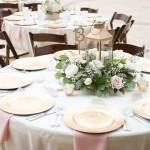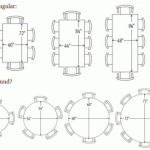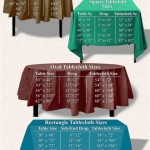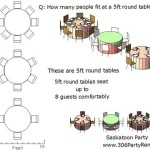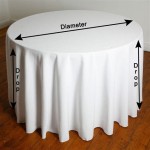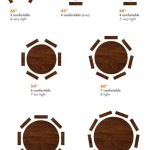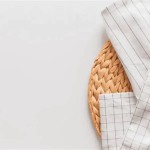How to Create Table Runners
Table runners add a touch of elegance and personality to any dining setting. Whether for everyday use or special occasions, a handmade table runner can be a rewarding project. This article provides a comprehensive guide on creating table runners, covering various techniques and materials.
Choosing the Right Fabric
Fabric selection plays a crucial role in the final appearance and functionality of the table runner. Consider these factors when choosing a material:
- Durability: Opt for durable fabrics like linen, cotton, or polyester blends for everyday use.
- Aesthetics: Choose a fabric that complements the existing décor and the desired ambiance.
- Ease of Care: Consider the cleaning requirements; washable fabrics are generally preferred.
- Drape: The way the fabric falls contributes to the overall look. Linen offers a relaxed drape, while heavier fabrics provide a more formal feel.
- Pattern and Color: Select patterns and colors that enhance the dining space and reflect personal style.
Measuring and Cutting the Fabric
Accurate measurements are essential for a well-fitted table runner. Follow these steps for precise cutting:
- Table Measurement: Measure the length of the table.
- Overhang: Determine the desired overhang at each end of the table, typically between 6 to 12 inches.
- Runner Length Calculation: Add the table length and the total overhang to determine the final runner length.
- Width Determination: Choose the desired width of the runner, typically between 12 to 18 inches.
- Fabric Cutting: Carefully cut the fabric according to the calculated length and width, adding extra inches for seam allowances.
Creating a No-Sew Table Runner
For those seeking a quick and easy method, no-sew table runners offer a convenient alternative:
- Fabric Selection: Choose a fabric that does not fray easily, such as felt, burlap, or bonded fabric.
- Edge Finishing: Decorative edges can be achieved using techniques like pinking shears or fabric glue.
- Embellishments: Add embellishments like ribbons, tassels, or paint for personalization.
Sewing a Basic Table Runner
Sewing a table runner provides greater control over the final product and allows for more intricate designs:
- Hemming: Fold and press the edges of the fabric to create a hem, ensuring a neat and polished finish.
- Stitching: Using a sewing machine or hand-stitching, secure the hems in place.
- Mitered Corners (Optional): For a more professional look, create mitered corners by folding and stitching the corners diagonally.
Adding Decorative Elements
Enhance the visual appeal of the table runner with decorative elements:
- Appliqué: Add fabric shapes or designs to the runner surface using appliqué techniques.
- Embroidery: Embroider patterns or monograms for a personalized touch.
- Lace or Trim: Sew lace or trim along the edges of the runner for an elegant finish.
- Paint: Fabric paint can be used to create unique designs and patterns.
- Stencils: Utilize stencils to add intricate patterns and designs.
- Tassels or Fringe: Attach tassels or fringe to the ends of the runner for a decorative touch.
Creating a Reversible Table Runner
A reversible table runner offers versatility and allows for quick changes in décor:
- Fabric Selection: Choose two coordinating fabrics.
- Cutting: Cut two identical pieces of fabric for each chosen material.
- Sewing: Place the fabric pieces right sides together and stitch along the edges, leaving an opening for turning.
- Turning and Finishing: Turn the runner right side out and stitch the opening closed.
Caring for Your Table Runner
Proper care ensures the longevity of the table runner:
- Cleaning: Follow the care instructions for the specific fabric used. Most runners can be machine washed or hand washed.
- Ironing: Iron the runner as needed to maintain its appearance.
- Storage: Store the runner flat or rolled to prevent wrinkles and creases.
Exploring Different Styles
Table runners can be crafted in a variety of styles to suit various occasions and aesthetics:
- Rustic: Utilize natural fabrics like burlap or linen with simple designs for a rustic charm.
- Modern: Opt for bold colors and geometric patterns for a contemporary look.
- Traditional: Incorporate classic patterns and elegant fabrics like damask or silk for a traditional setting.
- Seasonal: Create runners with seasonal themes and colors for festive occasions.
Utilizing Different Techniques
Explore various techniques to create unique and personalized table runners:
- Quilting: Piece together different fabric squares to create a quilted table runner.
- Patchwork: Combine various fabric scraps to create a patchwork design.
- Dyeing: Experiment with fabric dyes to create custom colors and patterns.

How To Make A Table Runner 3 Easy Diy Runners Treasurie

How To Make A Reversible Table Runner For Beginners

How To Make A Reversible Table Runner For Beginners

Make A Rustic Twig Table Runner

Tutorial How To Make A Simple Table Runner Sew My Place

Diy No Sew Table Runner Homey Oh My

Beginners Table Runner Very Detailed Instructions

5 Minute No Sew Diy Table Runner Using A Drop Cloth

How To Make A Table Runner An Easy Step By Guide Quilting Life

How To Sew A Table Runner 14 Steps With Pictures Wikihow
Related Posts


